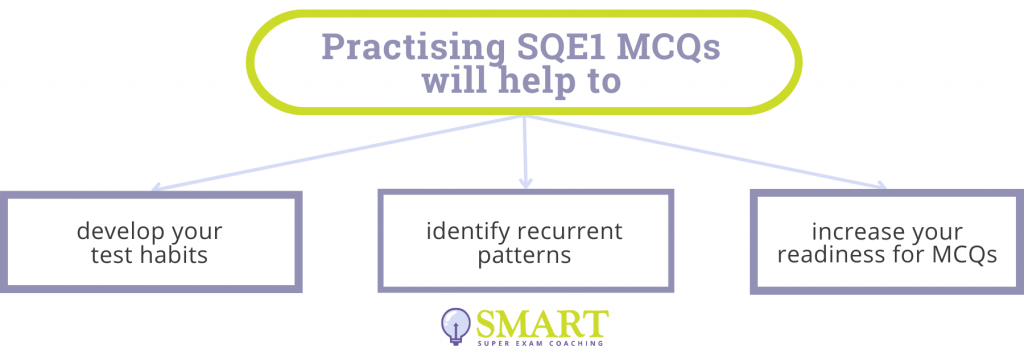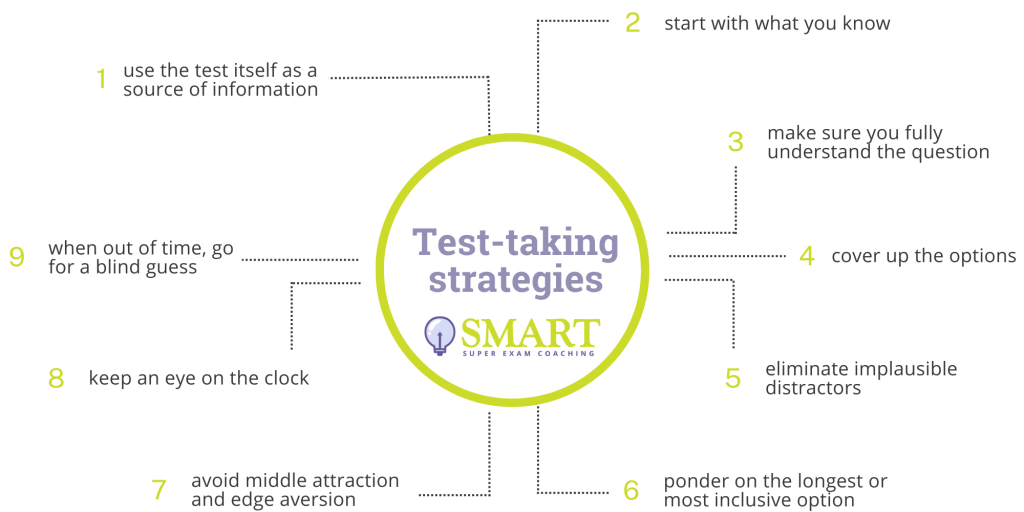Is your life at the moment rotating around the SQE1 exam and its example questions, with thoughts swirling around how to identify the correct answer? If that’s about you, here’s the good news: just by practising the SQE example questions, you can significantly improve your chances of scoring higher in this assessment. The point here is that passing the SQE1 is not just about having the knowledge to be tested – though your functioning legal knowledge is surely fundamental and must be obtained before you even book your assessment. To get an SQE 1 pass mark, you should also master the art of answering multiple choice questions (MCQs) as well as learn a range of skills and exam techniques.
SQE1 Preparation Strategies
- SQE1 simulations
- distributed practice
- rest between cognitive loads

We assume by now you have already read the SQE books and manuals on the law of England and Wales at least once, or are shortly going to complete your full circle of reading as a part of your sqe1 preparation course. At this stage, your next step can be self-testing – that has empirically been proved to produce better effects on long-term retention of legal knowledge than repeat rereading. To simulate the SQE 1 exam environment, the format of self-assessment should logically be multiple choice questions. Practising SQE1 MCQs is an effective way to:
- develop your test habits
- identify recurrent patterns
- increase your readiness for the SQE1 tests designed as MCQs.

Like any skill, handling the MCQs takes time – so our next suggestion is to start your superexam preparation in advance and practice on a regular basis. By doing so, you would reap the benefits of the so-called distributed practice where revision of your legal knowledge with gaps between exposures enhances memory and builds up SQE 1 exam-related skills. Applying this technique means:
- breaking the course materials into bite-sized segments
- allowing some time between successive segments.
And if your simulated SQE 1 testing is organised into a few blocks a day separated by breaks, guess what is the best activity to fill the break with? The answer is napping – so, do not forget to include it in your sqe1 preparation course!
Recent studies conducted in different countries have shown that a short daytime nap (60-100 minutes long, depending on the study) affects both the learning ability and long-term retention of the material. First, learners in the Nap group tended to perform equally well in the 12:00 and 18:00 learning sessions, while in the Non-Nap group there was a marked deterioration in the 18:00 performance. Second, when tested a week after the learning experiment, knowledge was best retained in the Nap group compared to the groups that either revised previously learned material, or remained awake and watched a movie.

SQE1 Test-Taking Strategies
While you are hopefully revisiting your study schedule and SQE1 exam preparation techniques, let’s look into the MCQ test-taking strategies that may help you discover non-apparent patterns and identify correct answers in the SQE multiple choice questions.
- STRATEGY 1. Use the test itself as a source of information. There are limits to the functioning legal knowledge that is assessed in the Solicitors Qualifying Examination. This means some of the incorrect options (distractors) given after one question can be helpful in answering another question in a different part of the SQE1 test.
- STRATEGY 2. Start with what you know. Based on Strategy 1, you do not want to get stuck at the very start of the SQE 1 exam. It seems more productive to make the best use of the confidence and energy you have brought to the SQE assessment centre by tackling the questions you find easy. As you gain a clearer focus and enter the flow state, you will be able to handle difficult questions – but not just now.
- STRATEGY 3. Make sure you fully understand the question. Before proceeding to the answer options, read the question and pay attention to each detail. The SQE1 is not an oral assessment and you won’t be able to clarify anything from your assessor. Many SQE candidates realise they misunderstood the question only after they leave the Pearson VUE test centre. To avoid this, you may want to read the question twice before considering the answers, and ask yourself if you are answering the question being asked.
- STRATEGY 4. Cover up the options. Upon reading the question, try to come up with an answer of your own – before even looking at the answer options. After all, you have come to the SQE1 MCQ test fully prepared, so can you perhaps figure out the correct answer for yourself? This strategy will help you to avoid the distraction provided by the five answer options and perceive them more critically.
- STRATEGY 5. Eliminate implausible distractors. Out of the five answer options offered to each question in the SQE multiple choice assessment, four serve as distractors and are aimed at doing just that – distracting you. Eliminating the options that stand out as being obviously incorrect will leave you with fewer options to choose from – therefore with higher chances of giving the correct answer.
While the SQE1 examination is a high-stakes assessment of functioning legal knowledge written by experts in assessment and question writing, its questions can still contain some flaws. As shown by recent studies of common item writing flaws, up to 50% of multiple-choice questions contain implausible distractors, because in practice it is difficult to develop four fully functional distractors. Knowing this, you can simplify the task by eliminating at least one answer that is an obvious filler.
- STRATEGY 6. Ponder on the longest or most inclusive option. As evidenced by a few recent studies of common item writing flaws in high-stakes multiple choice assessments, the longest or most inclusive options frequently turn out to be correct answers. While this is a known fault criticised in MCQ writing guidelines, it still does occur in tests. Being aware of it, coupled with understanding of subject areas included in the SQE FLK1 and FLK2, may benefit test-wise candidates and result in scoring above the SQE 1 pass mark.
- STRATEGY 7. Avoid middle attraction and edge aversion. It appears that when doing multiple choice tests, we tend to be guided by the pattern that characterises human choices in general – being averse to the edges and biased toward the middle. When choosing a product on a grocery shelf or a bathroom stall to use, we are inclined to make our selection from the middle. As demonstrated by a study of choices from identical options, two middle rows accounted for 71% of the purchases when the same product was displayed on four supermarket rows. Similarly, there was a distinct tendency to use middle bathroom stalls – in 60% of the choices.
In order to resist this unconscious inclination, it is worth remembering that key balancing is one of the dominant MCQ-writing policies – which means in modern computerised tests, including those used in the SQE assessments, the keys are balanced and evenly distributed across all options.
- STRATEGY 8. Keep an eye on the clock. Each of the two days of the SQE1 exam (for FLK1 and FLK2), you will be given 180 MCQs to be answered in two sessions. This arrangement gives you 2 hours 33 minutes (153 minutes) to complete 90 questions. We’d suggest allowing 15 minutes (900 seconds) at the end for checking your answers – which means 10 seconds to go over each question. This leaves 138 minutes to answer all the questions, or 1.53 minutes per question.
In order not to run out of time at the end of the SQE1 MCQ, don’t get stuck on difficult questions. Move from one question to another, do what you can and skip what you are struggling with. Once you have read all the questions and answered the easier ones, go back to those you have missed.
- Another key to effective time management is always sticking to timed conditions in your SQE1 preparation. Timing yourself when doing SQE1 sample questions or MCQs offered by your SQE1 prep course will help you to manage your time in the superexam, and make a difference to your SQE1 mark.
- STRATEGY 9. When out of time, go for a blind guess. As shown by quite a few studies, guessing is also a success factor in MCQ tests. So if nothing else works, that’s your last resort.
When guessing, the least risky strategy is the so-called tail-run – a sequence of identical responses. Selecting one letter and sticking to it over a spread of SQE 1 questions will let you maximise your overall chances of guessing the correct answer.
Rather than being a magic wand, it’s just a better solution than leaving a question blank. However, don’t overdo it – the longer the run, the less likely is the guess!

All things considered, your SQE 1 success starts with thorough preparation aimed at accumulating legal knowledge and skills. Study SQE manuals for functioning legal knowledge to establish a strong foundation in the subject, be it dispute resolution from FLK 1, criminal law from FLK 2, or any other subject area like legal services, etc. In our sqe1 preparation course you will benefit from virtual classroom technologies and attend interactive online lectures and SQE seminars or webinars delivered by practising solicitors of England and Wales who will put your knowledge into context, help to navigate possible problem areas, and share their professional experience.
At the same time, even those SQE1 and SQE2 candidates who are familiar with the content may do poorly in the SQE assessments if they lack test-taking skills. Knowing and applying the strategies above helps you to feel more confident in the legal knowledge assessments and maximise your Solicitors Qualifying Examination result.
Please note, being provided for general SQE guidance, this article does not constitute legal advice or provision of legal services, and as such must not be viewed as the sole factor guiding the choices and decisions made in your legal practice.
FYI: pass rates from the SQE1 July 2023 Statistical Report, SRA
|
Statistic |
FLK1 |
FLK2 |
SQE1 overall |
|
Passing Score | 53% | 52% |
– |
|
Candidates (All) | 3647
| 3755
| 3475
|
|
Pass Rate (All candidates) | 66% | 58% | 53% |
|
Candidates (First attempt only) | 3038
| 3035
| 3005
|
|
Pass Rate (First attempt only) | 68% | 59% | 56% |


